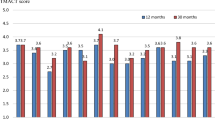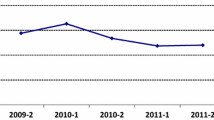Abstract
The impact of variable implementation of the Assertive Community Treatment (ACT) model on patient outcomes is increasingly recognised. We conducted the first study of four established Australian ACT teams, examining team composition, processes and model fidelity, using previously validated questionnaires. Demographic and clinical details of patients and their own experiences of ACT were gathered from staff. Associations between burnout and work experiences were examined. All teams were ACT-like (mean DACTS score = 3.7, SD = 0.3) with few significant patient differences between teams, except diagnosis (schizophrenia 61–93%, co-morbid substance abuse 16–33%) and proportion living alone (23–72%). Clinicians were fairly satisfied, but inter-team differences in staffing profile and experience emerged and one team scored highly on emotional exhaustion. Increased burnout was associated with greater stress due to taking a team approach. Inter-team differences suggested that attention to effective team working and leadership, as well as model fidelity, may be warranted.
Similar content being viewed by others
References
Ash, D., Brown, P., Burvill, P., Davies, J., Hughson, B., Meadows, G., et al. (2007). Mental health services in the Australian states and territories. In G. Meadows, B. Singh, & M. Grigg (Eds.), Mental health in Australia: Collaborative community practice (2nd ed., pp. 99–131). South Melbourne: Oxford University Press.
Australian Bureau of Statistics. (2003a). Regional population growth Australia and New Zealand, 2001–2002 (Publication). Retrieved July 10, 2007, from http://www.abs.gov.au/AUSSTATS/abs@.nsf/ProductsbyReleaseDate/29D57E46C7CB3897CA256E54007167F3?OpenDocument#.
Australian Bureau of Statistics. (2003b). 2001 census: Socio-economic indices for areas. Canberra: Australian Bureau of Statistics.
Billings, J., Johnson, S., Bebbington, P., Greaves, A., Priebe, S., Muijen, M., et al. (2003). Assertive outreach teams in London: Staff experiences and perceptions. Pan-London Assertive Outreach Study, part 2. British Journal of Psychiatry, 183, 139–147.
Bond, G. R. (1990). Intensive case management. Hospital & Community Psychiatry, 41(8), 927–928.
Bond, G., Drake, R. E., Mueser, K. T., & Becker, D. R. (1997). An update on supported employment for people with severe mental illness. Psychiatric Services, 48(3), 335–346.
Burns, T., Catty, J., Dash, M., Roberts, C., Lockwood, A., & Marshall, M. (2007). Use of intensive case management to reduce time in hospital in people with severe mental illness: Systematic review and meta-regression. British Medical Journal, 335(7615), 336–342.
Burns, T., Creed, F., Fahy, T., Thompson, S., Tryrer, P., & White, I. (1999). Intensive versus standard case management for severe psychotic illness: A randomised trial. Lancet, 353(9171), 2185–2189.
Catty, J., Burns, T., Knapp, M., Watt, H., Wright, C., Henderson, J., et al. (2002). Home treatment for mental health problems: A systematic review. Psychological Medicine, 32, 383–401.
Corrigan, P. W., Steiner, L., McCracken, S. G., Blaser, B., & Barr, M. (2001). Strategies for disseminating evidence-based practices to staff who treat people with serious mental illness. Psychiatric Services, 52(12), 1598–1606.
Drake, R., Mueser, K., & McHugo, G. (1986). Clinician ratings scales: Alcohol Use Scale (AUS), Drug Use Scale (DUS) and Substance Abuse Treatment Scale (SATS). In L. Sederer & B. Dickey (Eds.), Outcomes assessment in clinical practice. Baltimore: Williams and Wilkins.
Fiander, M., Burns, T., McHugo, G. J., & Drake, R. E. (2003). Assertive community treatment across the Atlantic: Comparison of model fidelity in the UK and USA. British Journal of Psychiatry, 182, 248–254.
Hambridge, J. A., & Rosen, A. (1994). Assertive community treatment for the seriously mentally ill in suburban Sydney: A programme description and evaluation. Australian and New Zealand Journal of Psychiatry, 28, 438–445.
Harvey, C., Killaspy, H., Martino, S., White, S., Priebe, S., Wright, C., et al. (2011). A comparison of the implementation of Assertive Community Treatment in Melbourne, Australia and London, England. Epidemiologia Psichiatria Sociale, 20(2), 151–161.
Health and Community Services. (1994). Victoria’s Mental Health Service. The framework for service delivery. Melbourne: Psychiatric Services division, Victoria.
Hoult, J. (1986). Community care of the acutely mentally ill. British Journal of Psychiatry, 149, 137–144.
Human Services Victoria. (1995). Mobile support and treatment services. Guidelines for service provision. Melbourne: Psychiatric Services Branch.
Issakidis, C., Sanderson, K., Teeson, M., Johnson, S., & Buhrich, N. (1999). Intensive case management in Australia: A randomized controlled trial. Acta Psychiatrica Scandinavica, 99, 360–367.
Joy, C. B., Adams, C. E., & Rice, K. (2002). Crisis intervention for people with severe mental illness (Cochrane review). In The Cochrane Library (Issue 3). Oxford, Update Software.
Killaspy, H., Bebbington, P., Blizard, R., Johnson, S., Nolan, F., Pilling, S., et al. (2006). The REACT study: Randomised evaluation of assertive community treatment in north London. British Medical Journal, 332(7545), 815–820.
Killaspy, H., Johnson, S., Pierce, B., Bebbington, P., Pilling, S., Nolan, F., et al. (2009). Successful engagement: a mixed methods study of the approaches of assertive community treatment and community mental health teams in the REACT trial. Social Psychiatry and Psychiatric Epidemiology, 44(7), 532–540.
King, R. (2006). Intensive case management: a critical re-appraisal of the scientific evidence for effectiveness. Administration Policy Mental Health and Mental Heath Services Research, 33(5), 529–535.
Kirsh, B., Cockburn, L., & Gewurtz, R. (2005). Best practice in occupational therapy: Program characteristics that influence vocational outcomes for people with serious mental illnesses. Canadian Journal of Occupational Therapy, 72(5), 265–279.
Marshall, M., Bond, G., Stein, L. I., Shepherd, G., McGrew, J., Hoult, J., et al. (1999). PRiSM psychosis study. Design limitations, questionable conclusions. British Journal of Psychiatry, 175, 501–503.
Marshall, M., & Lockwood, A. (1998). Assertive community treatment for people with severe mental disorders (Review) (Publication no. CD001089. doi:10.1002/14651858). Retrieved November 4, 2005, from John Wiley & Sons Ltd.
Maslach, C., Jackson, S. E., & Leiter, M. P. (1996). The Maslach Burnout Inventory (3rd ed.). Palo Alto, CA: Consulting Psychologists Press.
McGrew, J. H., Bond, G. R., Dietzen, L., & Salyers, M. (1994). Measuring the fidelity of implementation of a mental health program model. Journal of Consulting and Clinical Psychology, 62(4), 670–678.
McHugo, G. J., Drake, R. E., Whitley, R., Bond, G. R., Campbell, K., Rapp, C. A., et al. (2007). Fidelity outcomes in the national implementing evidence-based practices project. Psychiatric Services, 58(10), 1279–1284.
Priebe, S., Fakhoury, W., Watts, J., Bebbington, P., Burns, T., Johnson, S., et al. (2003). Assertive outreach teams in London: Patient characteristics and outcomes. Pan-London Assertive Outreach Study, part 3. British Journal of Psychiatry, 183, 148–154.
Prosser, D., Johnson, S., Kuipers, E., Szmukler, G., Bebbington, P., & Thornicroft, G. (1997). Perceived sources of work stress and satisfaction among hospital and community mental health staff, and their relation to mental health, burnout and job satisfaction. Journal of Psychosom Research, 43(1), 51–59.
Rosen, A., Mueser, K., & Teesson, M. (2007). Assertive community treatment-issues from scientific and clinical literature with implications for practice. Journal of Rehabilitation Research and Development, 44(6), 813–825.
Salyers, M. P., Bond, G. R., Teague, G. B., Cox, J. F., Smith, M. E., Hicks, M. L., et al. (2003). Is it ACT yet? Real-world examples of evaluating the degree of implementation for assertive community treatment. Journal of Behavioral Health Services and Research, 30(3), 304–320.
SPSS. (2009). SPSS for Windows, Version 19. Chicago: SPSS Inc.
Stein, L. I., & Test, M. A. (1980). Alternatives to mental hospital treatment. Archives of General Psychiatry, 37, 392–397.
Sytema, S., Wunderink, L., Bloemers, W., Roorda, L., & Wiersma, D. (2007). Assertive community treatment in the Netherlands: A randomized controlled trial. Acta Psychiatrica Scandinavica, 116(2), 105–112.
Teague, G., Bond, G., & Drake, R. (1998). Program fidelity in assertive community treatment: Development and use of a measure. American Journal of Orthopsychiatry, 68(2), 216–232.
Thornicroft, G., Wykes, T., Holloway, F., Johnson, S., & Szmukler, G. (1998). From efficacy to effectiveness in community mental health services. PRiSM Psychosis Study 10. British Journal of Psychiatry, 173, 423–427.
Victorian Government. (1986). Mental Health Act 1986. Melbourne: Department of Human Services.
Weiss, D. J., Dawis, R. V., England, G. W., & Lofquist, L. H. (1967). Manual for the Minnesota Satisfaction Questionnaire. Minnesota Studies in Vocational Rehabilitation: XXII. Minneapolis: University of Minnesota, Industrial Relations Center Work Adjustment Project.
Winter, J., & Caslyn, R. (2000). The Dartmouth Assertive Community Treatment Scale (DACTS): A generalizability study. Evaluation Review, 24(2), 319–337.
Wright, C., Burns, T., James, P., Billings, J., Johnson, S., Muijen, M., et al. (2003). Assertive outreach teams in London: Models of operation. Pan-London Assertive Outreach Study, part 1. British Journal of Psychiatry, 183, 132–138.
Acknowledgments
The authors thank all the MSTT team leaders and clinicians who participated in this study.
Author information
Authors and Affiliations
Corresponding author
Rights and permissions
About this article
Cite this article
Harvey, C., Killaspy, H., Martino, S. et al. Implementation of Assertive Community Treatment in Australia: Model Fidelity, Patient Characteristics and Staff Experiences. Community Ment Health J 48, 652–661 (2012). https://doi.org/10.1007/s10597-011-9466-x
Received:
Accepted:
Published:
Issue Date:
DOI: https://doi.org/10.1007/s10597-011-9466-x




